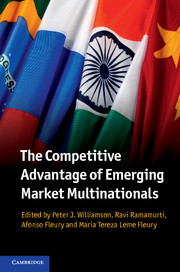Book contents
- Frontmatter
- Contents
- List of figures
- List of tables
- Notes on contributors
- Acknowledgements
- Introduction
- Part I Innovation and competitive advantage
- Commentaries on Part I
- (I.i) The contribution of innovation to EMNEs’ competitive advantage
- (I.ii) Innovation in emerging markets and the rise of emerging market MNEs
- Part II Value-chain configuration and competitive advantage
- Commentaries on Part II
- Part III Mergers and acquisitions and competitive advantage
- Commentaries on Part III
- References
- Index
(I.ii) - Innovation in emerging markets and the rise of emerging market MNEs
Published online by Cambridge University Press: 05 April 2013
- Frontmatter
- Contents
- List of figures
- List of tables
- Notes on contributors
- Acknowledgements
- Introduction
- Part I Innovation and competitive advantage
- Commentaries on Part I
- (I.i) The contribution of innovation to EMNEs’ competitive advantage
- (I.ii) Innovation in emerging markets and the rise of emerging market MNEs
- Part II Value-chain configuration and competitive advantage
- Commentaries on Part II
- Part III Mergers and acquisitions and competitive advantage
- Commentaries on Part III
- References
- Index
Summary
Introduction
As recently as the late twentieth century the archetypical multinational enterprise (MNE) was a hub and spoke system with the hub located in an advanced market economy, the major nodes located in other advanced economies and the minor nodes located in the rest of world. The main challenge of such an MNE was balancing local responsiveness with global integration (Bartlett and Ghoshal, 1989). By this time, Vernon’s (1966) product cycle model was becoming less applicable to finished goods and services, but it was still alive and well for knowledge creation. Innovation was still largely concentrated in advanced market economies and ‘exported’ to middle and lower income economies.
A key phenomenon of the early twenty-first century is the rise of emerging markets as players in extant global research and development (R&D) networks, as centres for development of new business models and as sources of ground-breaking yet ‘frugal’ innovations (Govindarajan and Ramamurti, 2011). As part of this trend, we have witnessed the appearance in world markets of competitive multinationals based in these markets (Khanna and Palepu, 1999a, 1999b). There is general agreement that such emerging market multinational enterprises (EMNEs) are becoming more important and that they do not fall into one or even a few easily recognisable categories (Mudambi, 2008; Ramamurti and Singh, 2009a). There is evidence that emerging market firms face significant resource and institutional gaps in their home markets requiring them to develop competencies to cope with these hurdles (Khanna and Palepu, 1999a; Cuervo-Cazurra and Genc, 2011). However, given the specific nature of local contexts (Meyer et al., 2011), it is unclear how these firms translate their locally relevant competencies in order to compete in global industries. Hence, there is much that is not understood about the process whereby EMNEs arise, survive and thrive.
- Type
- Chapter
- Information
- Publisher: Cambridge University PressPrint publication year: 2013



